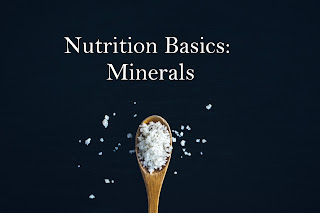Nutrition Basics Part 4: Minerals
Welcome back to my series on nutrition basics. So far, I've talked about carbohydrates, protein, fat, and vitamins.
Finally, it's time to talk about Minerals.
Finally, it's time to talk about Minerals.
Minerals
Minerals are elements (yes, like the Periodic Table of Elements) that our bodies need but cannot make. They are needed only in small amounts, usually less than 1 gram per day. In large amounts, some of them can have negative effects on health.
We get minerals by eating foods grown in soil that contains the minerals. They can also be added to foods and beverages by companies to make them more nutritious.
Macrominerals
Sometimes the minerals are categorized by how much our bodies needs. The minerals we need the most of are called macrominerals. The mineral we need the most of is calcium, followed by phosphorus, magnesium, sodium, potassium, chloride, and sulfur.
We can usually get enough of these minerals from the foods we eat. Doctors can measure your blood serum levels of these nutrients to decide if you need a supplement. You can also get them in an IV during a hospital visit.
All food nutrition facts labels should list the amount of sodium in the food. Food companies can choose to list the amount of calcium, magnesium, and potassium in foods. Labels do not usually list the amounts of phosphorus, chloride, and sulfur.
Many people get more than the recommended amount of sodium, because normal table salt is sodium chloride. Depending on your medical conditions, your doctor or dietitian may recommend you stop using table salt.
Trace & Ultratrace Elements
The minerals we need in smaller amounts are called trace and ultratrace elements.
These include arsenic, aluminum, boron, chromium, cobalt, copper, fluoride, iodine, iron, manganese, molybdenum, selenium, tin, vanadium, and zinc.
Your doctor can test blood levels of these and may recommend a supplement. The most common of these supplements are iron for iron deficiency anemia, iodine for goiter or thyroid disorder, and zinc for wound healing.
Minerals are elements (yes, like the Periodic Table of Elements) that our bodies need but cannot make. They are needed only in small amounts, usually less than 1 gram per day. In large amounts, some of them can have negative effects on health.
We get minerals by eating foods grown in soil that contains the minerals. They can also be added to foods and beverages by companies to make them more nutritious.
 |
| Plants, like this basil, get minerals from the soil. Photo by Markus Spiske |
Macrominerals
Sometimes the minerals are categorized by how much our bodies needs. The minerals we need the most of are called macrominerals. The mineral we need the most of is calcium, followed by phosphorus, magnesium, sodium, potassium, chloride, and sulfur.
We can usually get enough of these minerals from the foods we eat. Doctors can measure your blood serum levels of these nutrients to decide if you need a supplement. You can also get them in an IV during a hospital visit.
All food nutrition facts labels should list the amount of sodium in the food. Food companies can choose to list the amount of calcium, magnesium, and potassium in foods. Labels do not usually list the amounts of phosphorus, chloride, and sulfur.
Many people get more than the recommended amount of sodium, because normal table salt is sodium chloride. Depending on your medical conditions, your doctor or dietitian may recommend you stop using table salt.
 |
| Photo by Emmy Smith |
Trace & Ultratrace Elements
The minerals we need in smaller amounts are called trace and ultratrace elements.
These include arsenic, aluminum, boron, chromium, cobalt, copper, fluoride, iodine, iron, manganese, molybdenum, selenium, tin, vanadium, and zinc.
Your doctor can test blood levels of these and may recommend a supplement. The most common of these supplements are iron for iron deficiency anemia, iodine for goiter or thyroid disorder, and zinc for wound healing.
 |
| Photo by Amanda Jones |
Disclaimer: The information provided above is for educational purposes only. Please talk to your dietitian or another healthcare provider for individualized advice. To find a dietitian, visit EatRight.org
As an Amazon Associate, I earn from qualifying purchases.
As an Amazon Associate, I earn from qualifying purchases.
